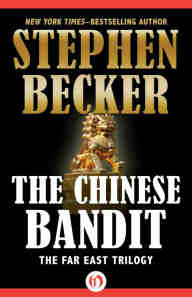
First published in 1975; published by Open Road Media on January 12, 2016
The Chinese Bandit is a classic adventure story. The title is misleading because many of the characters are bandits at heart. Traders and military officers are as likely to engage in a form of banditry as actual bandits -- which makes the bandits, in an odd way, more honest than the traders and officers. The title ironically refers to Jake Dodds, who isn’t Chinese and is no more of a bandit than most of the other characters.
The Chinese Bandit begins in the summer of 1947. As a Marine with twelve years of service, including a Purple Heart that he earned in Japan, Dodds has a mixed military record. Alcohol, brawling, and petty theft impaired his opportunity for career advancement, not that he particularly wanted to rise in the ranks. But now he’s in China, the war is over, and he’s made some money by arranging for Chinese buyers to steal supplies from a military truck. His colonel wants him to reenlist but that option becomes less attractive after Jake punches a general. Thus does Jake begin a new career, most of which is devoted to the avoidance of death.
With a little help from his Chinese friends, Jake leaves Peking. He hopes to make it to Turkestan, “where peaches, plums and melons grew, and men had four wives, and a foreigner could grow rich in gold and silver and mountain furs.” For the first leg of the journey, however, he must work as a camel-puller on a dangerous trek to Mongolia. Through unhappy circumstances, he later finds himself traveling with a roving group of bandits, conquering each day as it comes.
The literary themes of conflict -- man against man, against nature, and against himself -- weave together as Jake struggles with bandits, with the barren lands, and with his conscience. Low-key humor is infused in the story, partially in the form of Dodds’ irreverence, partially due to Stephen Becker’s dry wit. I particularly enjoyed the English translations of the characters’ creative Chinese cursing (favorites include “Dogs defile your great-grandmothers, all four of the chicken-defiling bags of dung” and “Bugger your mother and your father and all ancestors to the original generation of maggots”).
Yet there are also some poignant moments, revealing human behavior in the stark way that is common to westerns. Another section of the novel celebrates the joy of life, joy that can be found (or might best be found) in the most unexpected places. Friends can also be found in strange places and under odd circumstances, particularly if one is able to forgive old enemies. In fact, the story is one of personal transformation for Jake, as he discovers who he is and who he can become. But the will to change is one thing; the ability to overcome destiny is quite another.
In short, The Chinese Bandit is a rousing adventure story with depth, humor, and strong characters who engage in moral struggles. Becker is one of the underappreciated authors of the second half of the twentieth century. Works like The Chinese Bandit and A Covenant with Death allow Becker’s humility, honesty, and humanity to shine from his grave.
RECOMMENDED